In our country, today, if you ask me for one most misused / abused word, I would say ,it is the word “secularism” . It is closely followed by communal-ism.
The word secular originated from Latin saecularis or Old French seculer, meaning a generation or an age used to mean this world as different from Spiritual world.
Today, as defined by any dictionary , say wictionary, it means
Not connected with religious or spiritual matters . Some of the synonyms are non-religious,non-church,temporal,worldly,earthly etc. Some examples are Secular music, secular books, secular building etc.
A secular person is a non-religious person (definitely not someone who attends every iftar and Christmas gathering)
A secular state is a non-religious state . Ancient India did not have a concept of a religious state, so one needs to look at European history to understand what a religious state is. As it happens , even in the present day there are many modern Western States who are bound by constitution / laws to promote a particular faith. A case in point is the composition of the House of Lords wherein Up to 12 Church of England bishops may sit in the house as ex officio “Lords Spiritual”. (Only the Church of England, mind you, not any riff-raff denomination like Catholic or Presbyterian) In our country, the liberals are up in arms , even when a person gets duly elected to the parliament or the assembly, if he is religious.
Now , let us see how the religious states evolved to delink religion from state affairs, and in the process “discovered secularism in politics”.
There was a time when the Church was very powerful, more powerful than the kings. It had its own army and a hierarchy of officials for implementing the Lord’s will across the length and breadth of its domain , which was striving to expand forever.
Being a chess enthusiast, as a child I often wondered what a bishop had to do on the battle field . Chaturang (the four arms , infantry, cavalry, elephants and chariots under the king and prime minister ) in Europe , had become Chess .( pawns,bishops , knights and rooks under the King and Queen) . Later , I realized , If the Pope had to wield political power, the cardinals and bishops had to go into the battle along with the Knights. Even now when I look at a chess board I can visualize the Bishops and Knights criss crossing ‘battlefield Spain’ under the directions of King Ferdinand and Queen Isabella enforcing the Spanish Inquisition.
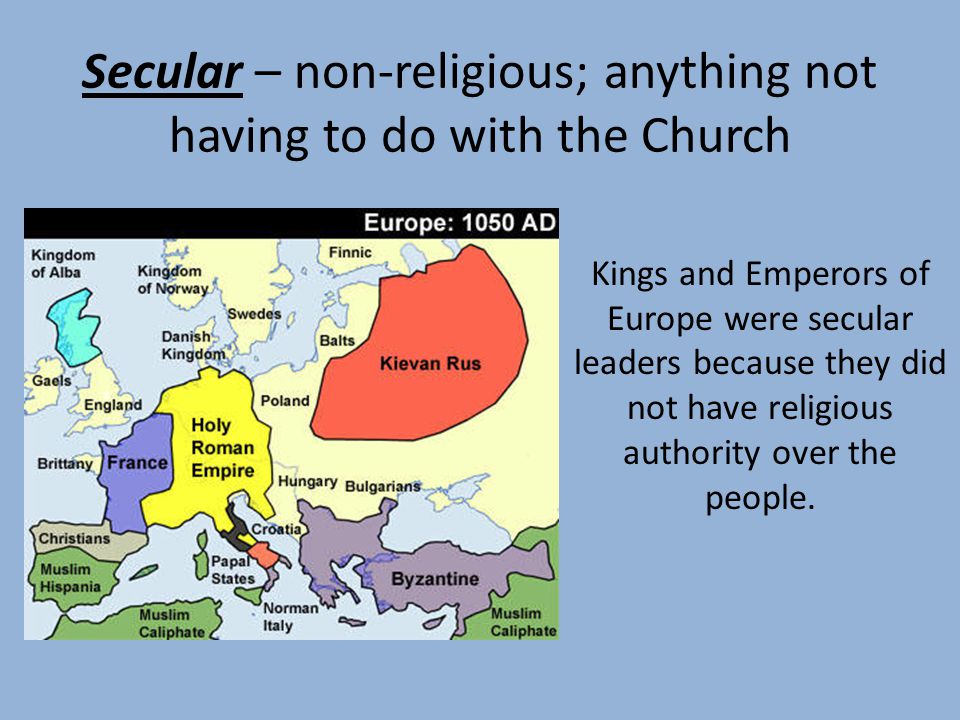
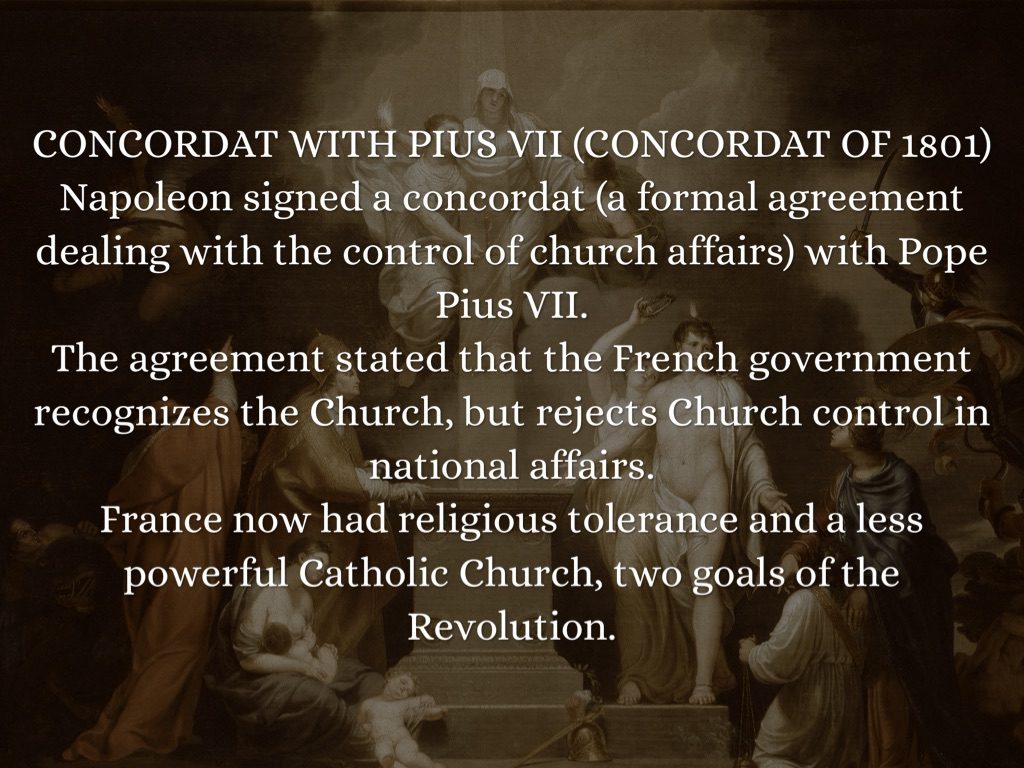
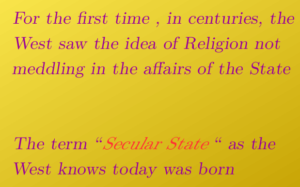
Now, let us have a look at the History of India , Ancient or medieval. Buddha or Shankaracharya or any other religious leader did not have armies like the ones Caliphs and the Popes had. So the idea of a Secular State was inherent in any Hindu Kingdom. Each dynasty had a favorite sect or God , keeping with the idea of Ishta devata. Ups and downs in popularity of a particular sect were more fluid and least violent. While Mahendra Pallava patronized the Jains more, his son Narasimha Pallava patronized the Shaivites more; but by and large all faiths were promoted and none were persecuted.
The only exception was the Sikhs under Guru Gobind Singh ; but this army was born to fight oppression rather than for persecution of heretics/ kafirs like the armies raised for crusades or the Spanish Inquisition. Still , a religious army has no place in a modern state and the country has already paid a heavy price in the effort to contain Khalisthan movement.
We come to 1948. The Indian Constitution was being drafted ,and it was proposed by KT Shah to include the word “Secular ” in the preamble, and it was Dr BR Ambedkar , who vehemently opposed it. He opposed it, not because he wanted a religious state(opposite of secular is religious , not communal ,we’ll come to it later) , but just found the word superfluous. Jawaharlal Nehru, who was keen on a socialist state was also happy omitting ‘secular’ and ‘socialist’.
It was left to his daughter Indira Gandhi to introduce the word in the preamble , that too during the Emergency period ,in 1976. Why was it introduced ? It was part of the 42nd amendment in a bid to retain power with herself and her party. The amendment was also called mini constitution as it was quite exhaustive in changes across the board. Mainly, she went after curbing the powers of Judiciary. Clauses like ‘anti national activities ‘ were introduced so that any one questioning her could be booked. The word ‘secular’ was introduced to beat the RW parties with , but even she would never have imagined as to what degree that word would be misused as it is being done today.
Suffice to say that the Amendment was unpopular and was forced down the throat of the nation, under emergency conditions. As it happens, some of the States who use the word Secular frequently did not ratify the 42nd Amendment; to name a few, J & K, Kerala and Tamilnadu.
Another joke is that opposite of “secular” is “communal”. Communal society is defined as a society in which everyone lives and works together and property and possessions are shared rather than being owned by a particular person. The community can be based on religion , ethnicity or any other factor. Living as a non religious community is actually called secular communalism. Now, try chewing on it.
How do we differentiate secular from communal in modern India ? A tall order indeed.
To simplify the process, RW community is called communal society while other religious communities are secular communities !!!
Now for some light hearted diversion ……
here’s an article calling bharathanatyam as cutural nationalism
https://thewire.in/books/from-national-culture-to-cultural-nationalism-an-extract-from-on-nationalism
The day when rasam (mulagutawny soup) became brahminical

Can wearing a saree make you communal ? may be it can, as Asgar Qadri in Ny times says it is a symbol of hindu nationalism.

Is bindi secular ? Christian educational institutions don’t think so . They do not let the children sport bindi. However, for Rana Ayub , a bindi is mandatory to prove her secular credentials.
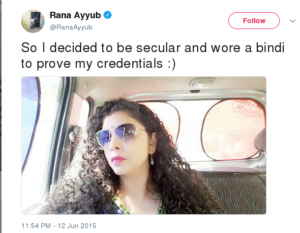
There are many more questions one finds on the social media platforms .Just posting a random tweet to have an idea of the the line of thinking… There are others tweets debating if idli is secular food or if a game of chess is secular ? Then we have a you know who , with a long secular beard lecturing on the kind of emoticons the secular community can use. As per him,
![]() ,
, ![]() or
or ![]()
are haram , thereby meaning not secular.
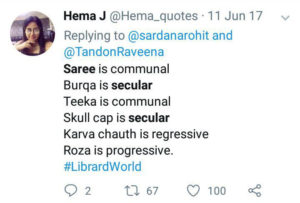
Finally, a picture which all “secular people” generally agree to be a truly secular image. Obviously , there seems to be Nothing Religious about it .
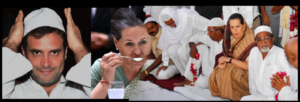

This word (secularism) has gained a usage – more rapier, to impugn rather than its original intent to separate governance from religious influence. From a theoretical perch, the lack of thought to rush and convey its political intent morphs its originality. I quote a poet (Rainer Maria Rilke) who is inbuilt with a philosophical bend, his articulation in a world of growing poignancy, of instant and hastily formed comment: “Leave to your opinions their own quiet undisturbed development, which, like all progress, must come from deep within and cannot be pressed or hurried by anything. Everything is gestation and then bringing forth. To let each impression and each germ of a feeling come to completion wholly in itself, in the dark, in the inexpressible, the unconscious, beyond the reach of one’s own intelligence, and await with deep humility and patience the birth-hour of a new clarity: that alone is living the life: in understanding as in creating.”
Secularism, is an undefined term in it’s usage. There are many words which grow into their colloquial meanings and used accordingly. Secularism, is one such word. All it implies is that the state won’t have it’s own stated religion, but will allow and protect every citizen to practice his/her religion with no restrictions. But, obviously we know the religious practices in public places/domain tend to enchroach upon each other’s. That’s wrong and needs regulations.
We have to have our own definition of Secularism, that has been conveniently avoided in 42 Amendment. We need not stick to another interpretation, which could be not well intended.